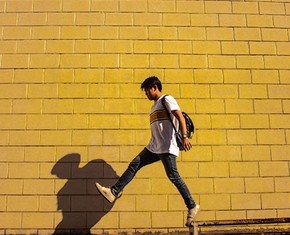The views expressed in our content reflect individual perspectives and do not represent the authoritative views of the Baha'i Faith.
So what hard work do we need to do to begin eradicating racism? The Baha’i teachings offer several effective prescriptions, all meant to be taken together.
First, the Baha’i writings advise us to recognize the teachings of human oneness Baha’u’llah brought. Baha’is believe that Baha’u’llah’s mission of human oneness and unity represent a prescription from the divine physician—a truly spiritual, God-given way to combat racism, separatism and prejudice:
This is the hour when ye must associate with all the earth’s peoples in extreme kindliness and love, and be to them the signs and tokens of God’s great mercy. Ye must become the very soul of the world, the living spirit in the body of the children of men. In this wondrous Age, at this time when [Baha’u’llah], bearing unnumbered gifts, hath risen above the horizon of the world, the Word of God hath infused such awesome power into the inmost essence of humankind that He hath … with His all-conquering might, unified the peoples in a vast sea of oneness. – Abdu’l-Baha, Selections from the Writings of Abdu’l-Baha, p. 20.
Second, after recognizing that all of us are essentially one, the Baha’i teachings advise everyone to get outside of their comfort zone and find ways to actually do what Abdu’l-Baha recommended and exemplified with his own actions—associate with and befriend all people:
Wherefore must the loved ones of God, laboriously, with the waters of their striving, tend and nourish and foster this tree of hope. In whatsoever land they dwell, let them with a whole heart befriend and be companions to those who are either close to them, or far removed. …. Let them never lose heart, never be despondent, never feel afflicted. The more antagonism they meet, the more let them show their own good faith; the more torments and calamities they have to face, the more generously let them pass round the bounteous cup. Such is the spirit which will become the life of the world, such is the spreading light at its heart … – Abdu’l-Baha, Selections from the Writings of Abdu’l-Baha, p. 257.
As the Baha’i teachings intimate, this action step won’t always be easy. It requires commitment, persistence and patience. Racism, prejudice and bias aren’t simple diseases to cure—they’re longstanding, virulent and deeply embedded. But they can be treated—with love, with caring and with an open heart. Shoghi Effendi, the Guardian of the Baha’i Faith, wrote about the “tremendous effort” anti-racism work entails for both whites and peoples of color:
A tremendous effort is required by both races if their outlook, their manners, and conduct are to reflect, in this darkened age, the spirit and teachings of the Faith of Baha’u’llah. Casting away once and for all the fallacious doctrine of racial superiority, with all its attendant evils, confusion, and miseries, and welcoming and encouraging the intermixture of races, and tearing down the barriers that now divide them, they should each endeavor, day and night, to fulfill their particular responsibilities in the common task which so urgently faces them. – Shoghi Effendi, The Advent of Divine Justice, p. 40.
Third, and perhaps most relevant today, in his evaluation of the work necessary to eradicate racism Shoghi Effendi actually gave different prescriptions to whites and to peoples of color:
Let the white make a supreme effort in their resolve to contribute their share to the solution of this problem, to abandon once for all their usually inherent and at times subconscious sense of superiority, to correct their tendency towards revealing a patronizing attitude towards the members of the other race, to persuade them through their intimate, spontaneous and informal association with them of the genuineness of their friendship and the sincerity of their intentions, and to master their impatience of any lack of responsiveness on the part of a people who have received, for so long a period, such grievous and slow-healing wounds. – Ibid.
For people of color, especially those of African descent, Shoghi Effendi advised them to:
… show by every means in their power the warmth of their response, their readiness to forget the past, and their ability to wipe out every trace of suspicion that may still linger in their hearts and minds. Let neither think that the solution of so vast a problem is a matter that exclusively concerns the other. – Ibid., p. 40.
Racism and racial prejudice, from a Baha’i perspective, concerns everyone—not just the victims of the disease, but everyone:
Let neither [racial group] think that such a problem can either easily or immediately be resolved. Let neither think that they can wait confidently for the solution of this problem until the initiative has been taken, and the favorable circumstances created, by agencies that stand outside the orbit of their Faith. Let neither think that anything short of genuine love, extreme patience, true humility, consummate tact, sound initiative, mature wisdom, and deliberate, persistent, and prayerful effort, can succeed in blotting out the stain which this patent evil has left on the fair name of their common country. – Ibid.
Finally, even though the work of eradicating racism may prove supremely difficult for all people, and no matter how heated or trying or frustrating it may become, the Baha’i teachings recommend courtesy:
O people of God! I admonish you to observe courtesy, for above all else it is the prince of virtues. Well is it with him who is illumined with the light of courtesy and is attired with the vesture of uprightness. Whoso is endued with courtesy hath indeed attained a sublime station. It is hoped that this Wronged One and everyone else may be enabled to acquire it, hold fast unto it, observe it, and fix our gaze upon it. This is a binding command which hath streamed forth from the Pen of the Most Great Name. – Baha’u’llah, Tablets of Baha’u’llah, p. 88.
Let me end these thoughts hoping that they will be received in the spirit of love, the promotion of unity, in becoming our true selves, and in praising Baha’u’llah for giving us the true prescription for curing the virulent disease of racism.
You May Also Like
Comments

















Peace, Walter